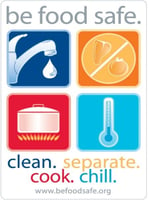
By
Rob Boyle
October 10, 2024
Updated
October 10, 2024

What is food safety and why is it important?
Kitchen safety awareness is crucial during food preparation and cooking, as well as during clean-up and daily living. Understanding the hazards present in the kitchen can help you avoid causing an accident or food poisoning.
How can I identify kitchen safety hazards?
In order to stay safe in the kitchen, it is important to understand the dangers present in this area of your home. From sharp knives to hot stoves, reading up on kitchen hazards can help you change your habits and protect your family.
Whether your stove is gas or electric, it can pose a safety risk for every member of the household. Many people have burned their hands on a hot stove or reaching into an oven without a proper oven mitt. There is a utensil drawer in every kitchen, filled with forks, knives, and other sharp objects that could potentially result in puncture injuries if not stored properly and handled with care.
How can I practice proper food safety?
 In addition to the hazards from heat and sharp objects, the kitchen also presents safety concerns surrounding food preparation.
In addition to the hazards from heat and sharp objects, the kitchen also presents safety concerns surrounding food preparation.
Improper food preparation can lead to food poisoning like salmonella.
Keep this in mind when preparing food safely for yourself and your family. Food safety actually starts before you even get to the kitchen, and how you store your food is also an important part of kitchen safety.
Don't cross-contaminate food
Meat, fish, and poultry are more susceptible to certain food-borne pathogens, so it is important to keep these foods separate from vegetables and other items. Below are some tips that will help you avoid contamination:
- Use separate, clean cutting boards for each type of food. Be sure to use plastic cutting boards that you can sanitize in the dishwasher and that are in good condition.
- Sanitize other food surfaces after cutting up meat or fish. Use a weak bleach solution on counter tops.
- Wash your hands thoroughly after cutting meat.
- Never return cooked food to the same plate you used for raw food.
Use good cleaning practices
- Clean the kitchen sink regularly and after use.
- Sanitize surfaces and clean utensils well.
- Use paper towels for hands.
- Wash dishcloths and sponges regularly.
Prevent illness and accidents
Being aware of kitchen hazards and taking care with your food handling and cleaning can help keep you and your family safe from accidents and food poisoning. Although these measures may seem time-consuming, they can prevent illness and accidents and put your mind at ease.
Cooking and eating outdoors
 Cover food and beverages when outdoors to keep bees, wasps, and other bugs away.
Cover food and beverages when outdoors to keep bees, wasps, and other bugs away.- Wash your hands while preparing the food.
- Bring a cooler or ice chest to keep cold foods cold.
- Don't leave your food spread out all day. Allowing food to sit in outdoor temperatures can invite foodborne illness.
The U.S. FDA suggests never leaving food out for more than one (1) hour when the temperature is above 90°F (32°C) and not more than two hours at other times.
While mayonnaise and other egg dishes are often associated with food poisoning, any food can potentially become contaminated.
